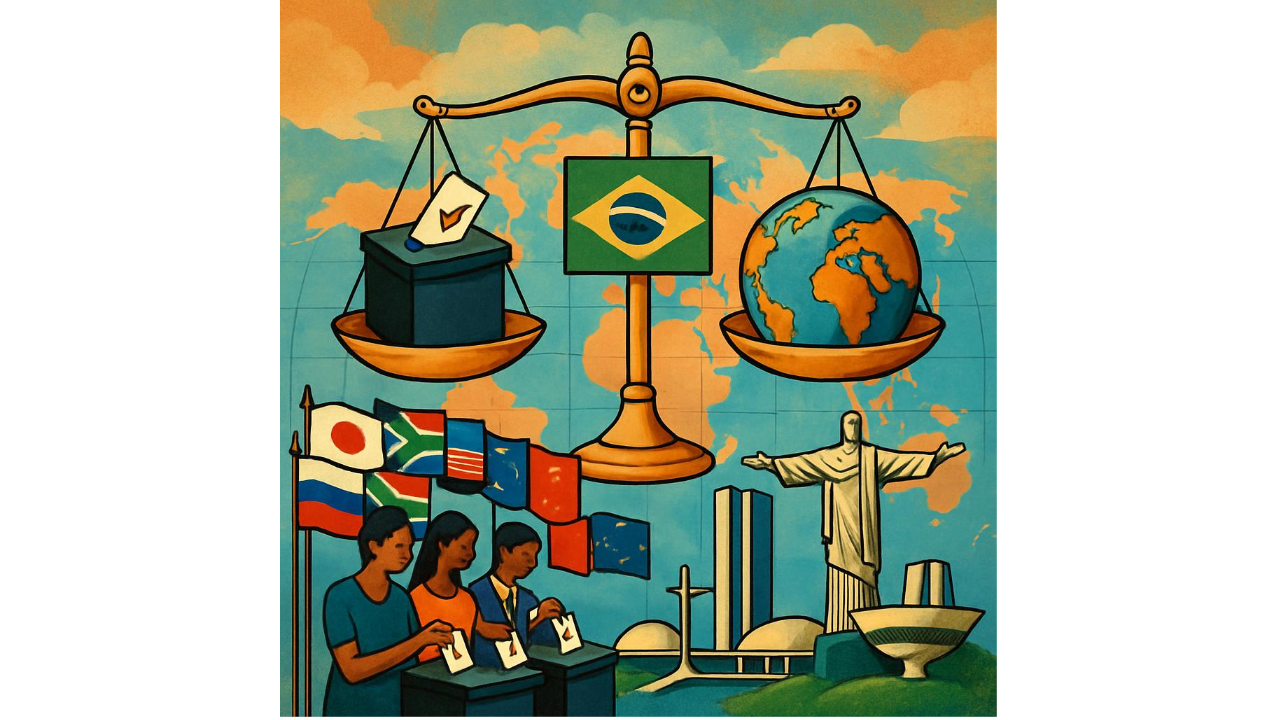Brazil’s Balancing Act: Partnering with the Multi-Polar Authoritarian World While Being a Democratic Power
Brazil’s President Luiz Inácio Lula da Silva stood alongside Chinese President Xi Jinping in Beijing last month, signing dozens of trade agreements worth billions of dollars.
Meanwhile, his administration continues to advocate for diplomatic solutions to the Ukraine conflict while maintaining cordial relations with Moscow through the BRICS bloc.
For Brazil, this represents a carefully calculated strategy of strategic autonomy. For its democratic allies, it’s becoming an increasingly uncomfortable balancing act.
As global tensions intensify and great powers demand clearer allegiances, Brazil’s ability to maintain partnerships with both democratic allies and authoritarian powers is facing unprecedented strain.
The question is no longer whether this approach is sustainable, but how long Brazil can avoid making harder choices that could compromise either its economic interests or its democratic solidarity.
The Economic Foundation
Brazil’s relationship with China exemplifies the economic pragmatism driving its foreign policy. China is Brazil’s largest trading partner, with China accounting for 76.6% of Brazil’s soybean exports in the first quarter of 2025. The numbers are staggering: bilateral trade between the two countries reached $181.53 billion in 2023, marking a 6.1 percent year-on-year increase.
The relationship has deepened dramatically during Lula’s third term. In May 2025, China and Brazil signed 20 agreements, including deals for more Brazilian agricultural exports to China, currency swap arrangements, and mining partnerships.
Chinese investments are flowing into sectors ranging from renewable energy to electric vehicles, with more than $4.5 billion of upcoming Chinese investments in Brazilian sectors ranging from automaking and renewable energy to pharmaceuticals and semiconductors.
This economic interdependence extends beyond simple trade. In the first half of 2024, new energy vehicles manufactured in China accounted for 91% of all electric vehicles imported into Brazil¹. Brazil has also signed a real-yuan currency swap agreement to streamline bilateral trade and bypass the U.S. dollar entirely.
The BRICS Factor
Brazil’s relationship with Russia operates primarily through the BRICS mechanism, which has become increasingly important to Brasília’s vision of a multipolar world order. The group’s expansion in 2023 exemplifies its growing heft, but also brings new disagreements on issues such as Russia’s invasion of Ukraine.
Despite Russia’s aggression in Ukraine, Brazil has maintained diplomatic engagement with Moscow. Brazil has attempted to position itself as a potential mediator in the Ukraine conflict. In late May 2024, Brazil and China announced a peace plan that included hosting an international peace conference with representatives from both Russia and Ukraine⁷, though Ukrainian officials initially expressed doubt in the plan, saying the proposal only served Russian interests.
Democratic Institutions Under Pressure
Domestically, Brazil’s democratic institutions have proven remarkably resilient. Brazilian democracy endured four years of consistent attacks under Jair Bolsonaro, with the Supreme Federal Court and Superior Electoral Court serving as essential institutions in stopping authoritarian attempts.
The EU issued strong condemnation of the January 8, 2023 attacks on Brazilian democratic institutions, expressing solidarity with President Lula and supporting measures to restore order and respect for the rule of law.
However, Brazil’s foreign policy choices are creating new tensions with democratic allies. US Secretary of State Marco Rubio has admitted considering sanctions against Brazilian Supreme Court Justice Alexandre de Moraes under the Global Magnitsky Act for alleged human rights violations. This represents an unprecedented level of U.S. pressure on Brazil’s judicial independence.
The Sustainability Challenge
The central question facing Brazil is whether this balancing act can survive in an increasingly polarized world. Despite Russia’s desire to take BRICS in a more strongly anti-West direction, experts say members such as Brazil and India, with closer U.S. ties, will put up resistance.
Several factors are making Brazil’s position increasingly untenable.
First, the United States under President Trump has implemented a 10% reciprocal tariff on Brazil, though the macroeconomic conditions that create the surplus in favor of the US are unlikely to change in the short and medium terms.
Second, Brazil faces growing environmental restrictions from Europe, including carbon border adjustment mechanisms that could affect its exports.
In response, Brazil has begun developing defensive measures. Law No. 15.122/2025, known as the “Economic Reciprocity Law,” authorizes the Executive Branch to adopt countermeasures in the form of restrictions on imports or suspension of trade concessions when other countries adopt discriminatory measures against Brazil.
Looking Forward
Brazil’s strategy reflects a broader shift among middle powers seeking to maximize their diplomatic flexibility in a multipolar world. Brazil sees its relationship with China to increase desperately needed investment in the country’s economy, while using China’s “champion of the Global South” narrative to seek a more active position in shaping global governance.
Yet the costs of this approach are mounting. As the fortunes of the G7, G8, and G20 have waxed and waned, the BRICS coalition has deepened its efforts to challenge Western hegemony, seeking to reduce U.S. influence in global governance.
As global polarization intensifies, Brazil faces an increasingly binary choice: maintain profitable relationships with authoritarian powers at the cost of strained relations with democratic allies, or align more clearly with the West.
For now, Brazil continues to bet that the world has room for countries that refuse to choose sides. Whether that bet pays off may determine Brazil’s place in the global order, but also what kind of world order in which Brazil finds itself.
Featured image produced by an AI program.

